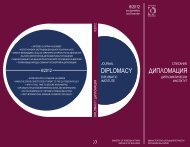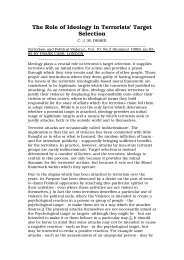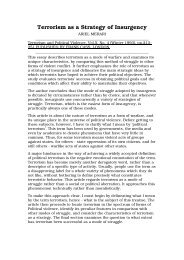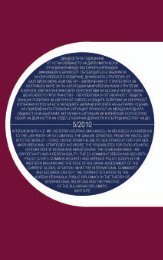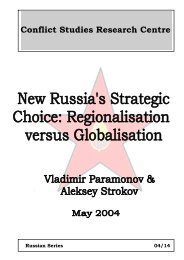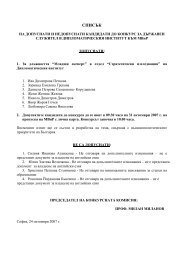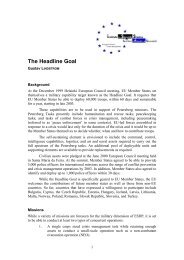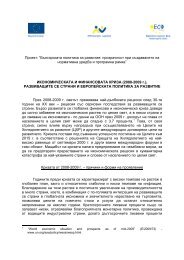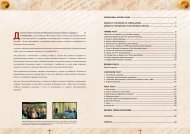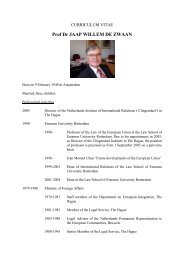The Myth of Ethnic Conflict: Chap 13 - Diplomatic Institute
The Myth of Ethnic Conflict: Chap 13 - Diplomatic Institute
The Myth of Ethnic Conflict: Chap 13 - Diplomatic Institute
Create successful ePaper yourself
Turn your PDF publications into a flip-book with our unique Google optimized e-Paper software.
480 Maria Todorova<br />
In short, historically virtually all attempts to politicize Pomak<br />
cultural identity failed. Because language and not religion became<br />
the national identity marker, Pomaks became Bulgarians, stifling<br />
separatist impulses. At the same time, as we shall see in more detail<br />
below, Pomaks were marginalized in Bulgarian society and made to<br />
feel inferior, despite formal institutional attempts to integrate them<br />
into the “nation.” That marginalization would later make them vulnerable<br />
to attempts by political entrepreneurs to mobilize them for<br />
political action by politicizing their group identity.<br />
ASCRIPTIVE IDENTITY AND SELF-IDENTITY<br />
<strong>The</strong> current terms used in both the scholarly literature and the<br />
press to denote the Bulgarian-speaking Muslims—pomatsi (Pomaks)<br />
and bîlgaromohamedani (Bulgaro-Mohammedans—i.e., Bulgarian<br />
Muslims)—are ascriptive and as a whole are avoided by the group<br />
they designate. 24 It seems that the term Pomak was used in public<br />
discourse for one <strong>of</strong> the first times when it attracted the attention <strong>of</strong><br />
Vassil Aprilov, a wealthy Bulgarian merchant and important figure<br />
<strong>of</strong> the Bulgarian cultural revival during the nineteenth century. In<br />
his Odessa-based newspaper Denitsa na novobîlgarskoto obrazovanie<br />
(<strong>The</strong> morning star <strong>of</strong> modern Bulgarian education), Aprilov wrote in<br />
1841 about<br />
Bulgarians who pr<strong>of</strong>ess the Mohammedan faith. . . . In their family<br />
circle and with other Bulgarians they speak the Bulgarian language<br />
and Turkish with the Greeks and with the Turks. <strong>The</strong>ir<br />
personal names are also Turkish. . . . All <strong>of</strong> their Turkified brethren<br />
the Bulgarians call Pomaks, the meaning <strong>of</strong> which I have not<br />
found out yet. 25<br />
This quote is not only one <strong>of</strong> the earliest documentations <strong>of</strong> the term,<br />
but also aptly illustrates an important element which has persisted<br />
ever since: the conjunction <strong>of</strong> Turks with Muslims (the Islamized<br />
Bulgarians are Turkified; they have Turkish, not Muslim, names).<br />
Three decades later Felix Kanitz, the famous author <strong>of</strong> “Donau-<br />
Bulgarien und der Balkan,” not only gave a valuable description <strong>of</strong><br />
the “moslemisch-bulgarishen Pomaci,” but also <strong>of</strong>fered an etymology



